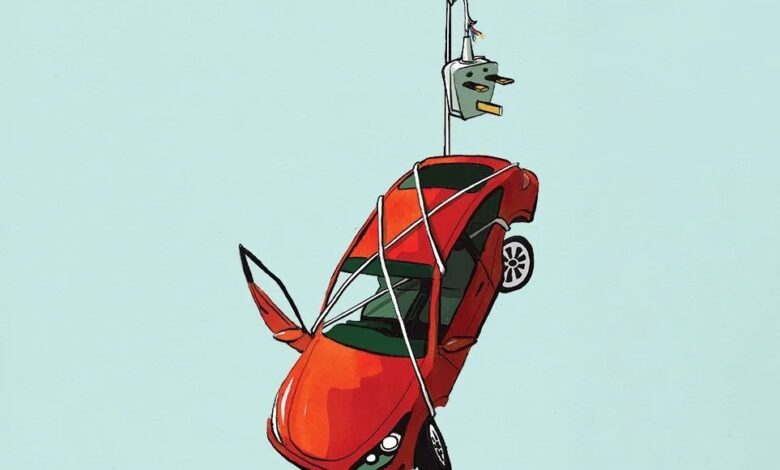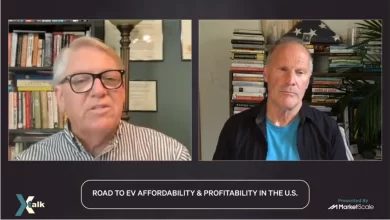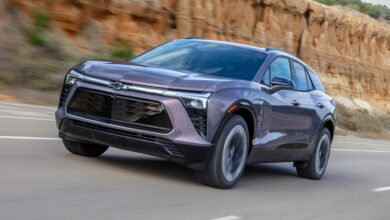Where is the electric vehicle revolution?

China is often characterized as a copycat when it comes to industry and technology but in one way it has proved to be a pioneer. It was China which saw the first boom in electric cars — and it was China that was the first to suffer when demand for them collapsed. The vast graveyards of unsold vehicles found in Hangzhou and other Chinese cities are the result of a huge, subsidized push to manufacture electric vehicles, demand for which has never caught up with supply. Ride-share services bought the vehicles — in a rerun of the great cycle-share fiasco of 2018, which led to piles of unused and unwanted bikes. But private buyers have been notably less keen.
Where China leads, the rest of the world seems doomed to follow. With China’s manufacturers struggling to sell their electric cars at home, last year they started shipping them in large numbers to Europe — where many are now accumulating in ports at Rotterdam and Antwerp. The window in which to sell them may prove small, as the EU is considering measures to prevent the “dumping” of cheap Chinese cars in Europe. The Biden administration has already taken action, increasing tariffs on cars imported from China from 25 percent to 100 percent. While that may put paid to Chinese imports, it won’t do anything to alleviate unsold stocks of US-made electric cars. The great electric revolution that was promised just three years ago is already failing — and it will bring the car manufacturers down with it.
Unless sales soar, car manufacturers are going to be facing enormous fines in just a few months’ time
If there ever was a real-world demonstration of the old proverb “you can lead a horse to water…,” it is electric cars. Elon Musk’s visionary work with Tesla panicked the old combustion engine firms, which set themselves ambitious targets to phaseout gasoline completely: Fiat, Ford, Jeep, Nissan and Lexus by 2030, Vauxhall by 2028, Jaguar by 2025. One of the most dramatic announcements came three years ago when Hertz declared that a quarter of its entire rental fleet would be electric by 2025. “The new Hertz is going to lead the way as a mobility company,” it said. It certainly did lead the way — into headlong retreat.
At the time, Hertz signed a $4 billion deal with Tesla and announced plans to buy 175,000 EVs from General Motors. In January it went into reverse and said it would instead start selling 20,000 EVs (later raising this to 30,000). It has pledged to “re-invest a portion of the proceeds from the sale of EVs into the purchase of internal combustion engine vehicles.” Its share price (down 80 percent since the Tesla announcement) has made it a case study.
In Britain, things don’t look much better. The slowing EV momentum led prime minister Rishi Sunak to drop his target of banning new gas-powered car sales by 2030 and push it back to 2035. The number of electric cars sold to drivers (as opposed to companies) was falling by 20 percent as of last month. The UK’s market for EVs is being propped up by fleet companies which, spurred on by government incentives, now buy five in every six EVs sold.
“Urgent action is needed to re-enthuse private buyers into switching,” said the UK Society of Motor Manufacturers and Traders (SMMT) in its last update. It pointed out it’s not just driver demand that is flat: the infrastructure is an issue. The ratio of charging points to EV drivers has not improved since last year. The cost of electricity from a rapid charger is up by about 10 percent, according to the RAC. So not only are EVs themselves 40 percent more expensive to buy than gas cars, but they are also costlier to run. The average charge for refueling at a rapid charger is $.28 per mile, compared with $.22 for gas.
Even those figures don’t really provide a fair comparison. Around half the price of a quarter-gallon of gas is tax; the tax on electricity is just 20 percent or 5 percent if you charge at home. Nevertheless gasoline remains cheaper. But the British government is not going to sit by and watch as $30 billion of revenue from fuel duty disappears — which will happen if electric cars do take over. So at some point it is going to devise some way of recouping lost fuel duty revenue, most likely through road-charging. Early adopters who bought electric cars have effectively been treated to a generous introductory offer, which is now stealthily going to be withdrawn. When electric cars come to be taxed like gas ones, it is going to become obvious that they cost a lot more to buy and run. That is especially true if you live in one of the 30 percent of UK households which do not have off-street parking.
Sunak drew outrage from the green lobby when he delayed what was an obviously unworkable target. But few seemed to have noticed that he had left in place an initiative called the Zero Emission Vehicle (ZEV) mandate. This came into force in January and obliges car manufacturers to ensure that 22 percent of the vehicles they sell in Britain this year are fully electric (as opposed to hybrid). If they fail, they will have to pay a fine of $19,000 for every vehicle by which they fall short. This target ratchets up. It will rise to 28 percent next year and go up steadily until it hits 80 percent by 2030.
But what to do if the public are refusing to buy? In the first four months of this year, according to the SMMT, electric cars had a market share of just 15.7 percent, hardly up on the 15.4 percent share in the same period of last year. Unless sales soar, manufacturers are going to be facing enormous fines in just a few months’ time.
Earlier this month Carlos Tavares, the chief executive of Stellantis (the parent company of Vauxhall, Peugeot-Citroën and Fiat) warned that the ZEV had the potential to bankrupt car-makers. He complained that the ZEV had been set at “double the natural demand of the market.” He said he wouldn’t be selling cars at a loss — suggesting that, if electric car sales do not pick up soon, the company might have to restrict sales of gas and diesel cars. (It would be easier to sympathize had Stellantis not cheered on government efforts to turn the car industry fully electric by 2030.)
Gasoline-car owners have reservations that may be hard to budge. Even among households which have off-street parking, only 8 percent say that it’s likely they would buy an electric car as their main vehicle during the next five years — although 20 percent said they would consider one as their second vehicle. Electric cars have found a niche as second cars for relatively wealthy, environmentally aware households. But the market is beginning to run out of those kinds of buyers.
This leaves Sunak with a dilemma. The US wants to repel China’s incoming electric cars, while Germany wants to welcome them and cut all tariffs (hoping Beijing will reciprocate — BMW now sells a third of its new cars in China). What will the UK do? If Sunak wants to prioritize net-zero targets and help with the cost of living, the logical thing would be to leave the ZEV in place and welcome China’s low-cost cars (made by MG and BYD). This could be billed as using Brexit powers, lowering motoring costs with other carmakers forced to compete. But this is Stellantis’s nightmare scenario. “If you go and cut pricing disregarding the reality of cost,” Tavares said in January, “it’s a race to the bottom and that will end up with a bloodbath.”
Not only are EVs 40 percent more expensive to buy than gas cars, but they are also costlier to run
Forcing consumers to pay over the odds for cars would lead to an electoral bloodbath, however — which is why, unless there is a sudden rush of interest in electric cars over the next few months, the government is likely to yield. The ZEV will probably be relaxed, just as the 2030 target was relaxed last year, which will mean yet another watering-down of net-zero promises, possibly just before the election. The price will be more outrage from environmentalists and inevitable legal challenges. Last time Sunak relaxed net-zero measures, the former minister Chris Skidmore resigned his seat and triggered a by-election.
Could the outlook suddenly improve for British EVs? It’s hard to see how. The biggest single cost is batteries and China has built up a dominant position in the global market. About 80 percent of EV batteries are made in China, and the West’s efforts to catch up often end in debacle. The Britishvolt factory in Northumberland went bust before its foundations were even laid. But the situation is even worse when you consider that China has near-total dominance in LFP batteries, which are cheaper to produce than the lithium manganese cobalt (NMC) batteries made in Europe. They also come with fewer ethical objections as they do not require cobalt, which is often mined by child workers under terrible conditions in the Democratic Republic of the Congo.
The traditional carmakers have responded by scaling back. Aston Martin has delayed its first electric model from 2025 to 2027 because of falling demand. Bentley has deferred its all-electric deadline. Fiat was going to phase out the gasoline-powered Panda in 2026, then 2027, but now that date has been pushed back to 2030. Tesla’s deliveries fell 20 percent in the first quarter of this year and market value has halved since the 2021 peak.
Last week, Stellantis announced a deal with the Chinese electric carmaker Leapmotor, which might just help it put off the day of reckoning with the ZEV: some of Leapmotor’s cars will be sold through a Stellantis subsidiary based in Amsterdam. In reality, this won’t do much for the planet. Making electric cars is a much more carbon–intensive business than making gas ones, with the result that they have to be driven at least 15,000 to 20,000 miles before they can be said to have emitted less carbon. Worse, Chinese–made cars are manufactured with a far dirtier mix of electricity than western-made cars are. Three-quarters of electricity in China is still generated by fossil fuels, 55 percent of it from especially filthy coal. The government may well tinker with the ZEV before the year is out, but it is unlikely to admit to this greater folly, that the much–heralded switch to electric cars is likely to destroy our car industry, drive up costs for motorists — and fail to cut global emissions.
This article was originally published in The Spectator’s UK magazine. Subscribe to the World edition here.



